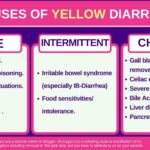When Should I Be Concerned About Black Stool? and When Not?
Black stool is caused by either gastrointestinal bleeding, black foods, or black medications. You should be concerned by black stool if you suspect bleeding inside your gut. common causes of black stools due to bleeding include peptic ulcer disease, bleeding esophageal varices, malformed blood vessels, or gastrointestinal cancers.
What causes black stool?
The normal color of your stool is brown or dark brown. However, the stool can turn black for many causes. The most important 3 causes of the black stool are:
- Blood.
Bleeding from the esophagus, stomach, or duodenum usually manifests as a “black tarry stool”. Often, you will not notice real “reddish” blood.
Bleeding is the most dangerous cause of black stool.
The dark blood that causes black stool is called “melena.” melena is a cause of concern. It requires urgent medical attention. - Black medications.
Some medications are black in the colon and cause your stool to turn black. If you have taken one of the medications listed below, it can turn your stool black.
Black stool due to medicines is often not a cause of concern.- Bismuth subsalicylates (Pepto Bismol)
- Iron-containing medications (especially if the dose is large).
- Activated charcoal.
- Black foods.
Some foods can cause black stool. It is not a cause of concern. Common foods that cause black stool are:- Blueberries.
- Black licorice.
- Blood sausage.
MORE: Can Vomiting Blood Cause Death?
When should you be concerned about black stool:
1- A true black, tarry stool (Melena).
The most important and most serious cause of black stool is melena. Melena is the presence of processed blackish blood in the stool.
Melena usually occurs due to bleeding from the upper portion of your digestive tract (the esophagus, stomach, duodenum, and the early part of your small intestine).
Bleeding could be due to ulcers, cancers, and malformed vessels.
A black stool due to melena is characterized by:
- Jet-black in color (not dark brown). It is usually described as a tar-like stool.
- Often, the stool is loose inconsistently, and you can experience black watery diarrhea.
- Has a characteristic fish-like smell.
- Your stool may also look or feel sticky.
- Associated symptoms of the cause such as severe upper stomach pain in “peptic ulcer disease”.
- In severe cases, melena is associated with vomiting of blood (hematemesis).
2- Symptoms or signs suggestive of peptic ulcer disease.
You should be concerned about your black stool if you have any symptoms or signs suggestive of Peptic ulcers.
Peptic ulcer disease is a medical term to describe ulcers affecting the stomach or the duodenum.
Having a previous history of peptic ulcer disease or chronic gastritis should raise the concern about black stool.
Symptoms and signs suggestive of peptic ulcer disease:
- History of analgesics intake (Non-steroidal Antiinflamatory drugs such as ibuprofen or diclophenac).
- Previous history of stomach or duodenal ulcer.
- Intense pain in the upper central part of your abdomen (epigastric pain).
- Nausea (and maybe vomiting of blood).
- Loss of appetite (anorexia).
- The pain is related to food (increases or decreases after eating).
- Massive bleeding can lead to dropping in your blood pressure (circulatory shock) and anemia. (Discussed below).
3- Symptoms or signs of low blood pressure.
Black stool due to melena is a result of any bleeding inside your gut track. Any massive bleeding from a peptic ulcer or other bleeding lesions as cancers or malformed vessels is a serious medical condition.
Massive gastrointestinal bleeding can lead to loss of large amounts of blood and a drop in your circulation. And the symptoms include:
- Feeling faint.
- Trouble breathing (rapid breathing and severe shortness of breath).
- sweating.
- Rapid heartbeats.
- Pale skin and face.
NOTE: circulatory shock due to massive bleeding is an emergency medical condition. If you have both black stool and signs of circulatory shock, call 911 immediately.
4- Symptoms or signs of colorectal cancer.
Cancer of the colon or the rectum can also present with black stool. usually, in the form of black spots in the stool or mixed black and reddish stool.
Suspect colorectal cancer if you:
- Are 40 years or older.
- Have a family history of colorectal cancer.
- Have black stool or reddish blood in the stool.
- Have altered bowel habits (constipation or diarrhea).
- Have signs of anemia.
- Have an unexplained fever.
- Have unexplained progressive weight loss.
- Have abdominal pain (it is not frequent with colorectal cancer).
Learn more about the Symptoms of colorectal cancer vs Irritable bowel syndrome symptoms.
Note that other types of gastrointestinal cancer can cause similar symptoms. the most common types are gastric cancer and esophageal cancer.
5- Symptoms or signs of anemia.
Recurrent or acute gastrointestinal bleeding can cause anemia. Having recurrent attacks of black stool together with signs of anemia can be a sign of bleeding.
Symptoms and signs of anemia include:
- Easy fatigue.
- Awareness of heartbeats (rapid heartbeats on ordinary efforts).
- Shortness of breath; particularly with ordinary efforts.
- Dizziness or lightheadedness.
- Pale or yellowish skin.
- The ringing of ears.
- cold hands or feet.
Learn more about the manifestations of anemia.
6- Unexplained abdominal pain.
The presence of black stool together with recent-onset or recurrent abdominal pain is a cause of concern. Unexplained abdominal pain with black stool is a sufficient reason to get a medical evaluation.
Abdominal pain is one of the most widespread symptoms. The majority of causes of abdominal pain are simple such as dyspepsia, gas, or functional diseases such as IBS.
However, when it is combined with black stool, you should be concerned.
7- Unexplained weight loss.
Unintentional loss of weight with recurrent attacks of black stool can be a sign of dangerous conditions such as gastrointestinal cancers.
Significant weight loss is defined as the loss of more than 5% of your body weight over 6-12 months without trying (reference).
8- Taking blood-thinning medications.
Another common cause of black stool is bleeding due to the use of blood-thinning medications.
Overdose of these medications can lead to serious gastrointestinal bleeding and black stool (melena).
Review your list of medications for:
- Warfarin (Coumadin, Jantoven).
- Enoxaparin (Lovenox).
- Dabigatran (Pradaxa).
- Apixaban (Eliquis).
- Rivaroxaban (Xarelto).
- Heparin.
Bleeding from these medications is often accompanied by skin bruising, bleeding nose, vomiting of blood, or reddish urine.
Learn more about blood-thinning medications.
MORE: 5 Causes of Bruising Easily All of a Sudden (In-depth).
When not to be concerned about black stool?
Black stool is not a cause of concern if you are:
- Taking medications that cause black stool such as Pepto Bismol, Iron supplements, or activated charcoal.
- Have a false black stool (Dark brown or Dark green, well-formed stool).
- Eating foods that cause black stool (mentioned before).






